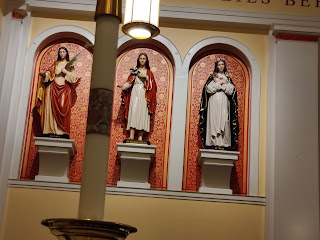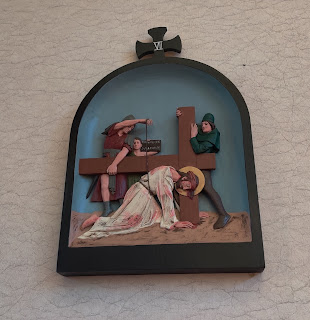On Saturday I worshipped at Hope of Israel Congregation, a Messianic community here in Charlotte. I mention that it was on a Saturday because this was an experience in a synagogue that was filled with believers of Yeshua Messiah (such language was in use throughout my visit, more on that throughout this post). I count it as one of the highlights in visiting one hundred churches thus far, it was simply inspiring and truly fascinating.
The congregation has a higher sensitivity to security than most, so I don't have any pictures or videos to share of the experience. But what I saw was really, really interesting and I am glad to recount it in words only.
First, what are Messianic Jews?
This is the term that is used for followers of Yeshua, which is the true name of The One that we follow, and who accept Him as Ha'Mashiach (the Hebrew word for "Messiah" or "Christ"). Even giving a description of this part of the Body of Christ requires me to use terminology that I am only slightly accustomed to. Many of the words are not normative for me based on my upbringing.
The question does arise - Are these Jewish Christians?
While that may seem to be a useful description to get to the heart of the matter, it is a wrong way of approaching the question of who these believers are. These are not Jews who are joining the mass of Gentiles who follow Jesus.
The answer to this question is truly a "no."
Instead, these are Jews living the extension of their very Jewish faith in which they understand the Redeemer of Israel and the World to have come in the person of Yeshua, the person we Gentiles call "Jesus."
If my description isn't clear, click here [link] to read their self-description, it's really concise.
To understand why this was so fascinating to me requires some description of the life I've led.
My life has been very much bound up in the Jewish community. I grew up in Westport, Connecticut. It was (and is) a town with a very large Jewish population, perhaps as high as one third of the town. I have often made quick friends with Jewish people in my peer groups. I worked in a kosher bakery while I was in graduate school, a place that served challah to the most observant Jews in New Haven, Connecticut back in the early 1990s. I have also traveled to Israel, which was a transformative experience for me. My travel companion to Israel was my fraternity brother and roommate, himself a Jew. In short, my entire life has been colored and shaped by my proximity to Jewish people.
To have had the experience of worshipping our common Messiah with Jewish people was simply an incredible thing for me.
I left my apartment early Saturday morning wearing a kippa that I had purchased in Jerusalem in 2017.
When I arrived at Hope of Israel, I saw a really attractive synagogue. It is a relatively new and nicely designed building. Here is a video [link] about the building's expansion. Below is a picture from the web:
When I entered, I wandered around for a bit, taking in the internal structure. My goal was to attend the equivalent of Sunday School (again, terminology breaks down quickly in this setting), so I arrived early. I asked a woman I met where the classes were meeting. She pointed me to a Men's Class down the hall. I later came to find out this was Rabbi Nadler's wife, Miriam.
When I joined the Men's Class, I was immediately struck by the diversity. There was a guy from Israel, a man from Latin America, another guy who led the class who seemed definitively Southern, and multiple other men of different backgrounds were gathered in person. There was also one man joining via video. Most, but not all, were wearing kippot. The rapport between the men was great, I could tell that they had built a solid community.
The lesson that was taught related to the tumult of the world around us. There was no need to level set on what was being talked about - the world is definitely in a very unique state of division and instability. We are all feeling it. This is especially acute as we move past one of the most divisive elections in the history of our Republic. Additionally, there has been political violence in the country for nearly a year now. And we are all living very differently due to the pandemic event that we find ourselves living through.
In short, this is a time when it would feel easy to be anxious, distracted, depressed and even under threat.
The message that was given during that class was that there are four directions we need to stay focused on as believers and as men.
- The first direction is upward, keeping our lives of prayer healthy and vital.
- The second direction is facing toward the Earth, where we can provide leadership and strength to those who depend on us. Our families are here.
- The third and fourth directions are to the right and left sides, where we engage with the world around us and all those who occupy those lateral relationships.
This is a simple and clear way to get our thinking organized in how we interact with the world around us as it goes through unprecedented convulsions of change.
One of the men mentioned that he has been a lifelong hunter. He mentioned how in hunting, it is essential not to get distracted by the things in the woods around you. The chirping of birds, the darting of a squirrel and huge gusts of wind are the things that can distract a hunter while tracking his prey. He made the point that we also need to avoid distractions of social media, political division and confused thinking within our own minds.
The point - life is like a hunt that requires men to focus and not get distracted as they pursue their prey.
Yes, yes and yes.
After the Men's Class, I went into the worship service. This was where things got extremely interesting! If everything I had seen thus far had been uniquely contextualized as a Hebrew setting filled with belief in Yeshua Messiah, the worship service itself took it up several levels.
The music started up and there were dancers doing traditional dances in the corner of the sanctuary. There was a bimah in the front, as is the case with every synagogue in the world. In the bimah was a Torah, wrapped in an embroidered cloth as you would also see at any synagogue around the world. Some of the praise songs were in English and Hebrew, with words from both languages and alphabets on the screens overhead. Many of the men were wearing a tallis. Most men in the sanctuary were wearing a kippa. People greeted each other with "Shabbat shalom," a greeting reserved for the Saturday Sabbath.
Of note, God was written as G-d very often. I may know a bit about this, so let me elaborate. The name of God that was given to Moses on Mount Sinai was יהוה . These four letters, read from right to left, are known as the tetragrammaton. Yod - hey - vav - hey. They roughly translate to YHWH or JHVH. This is where the words Yahweh and Jehovah come from.
While we Christians use the words God or The Lord in our lexicon, this is another example of the cultural drift that occurred as Messianic Judaism spilled over into our world.
God's true name is יהוה.
In Judaism, יהוה is something treated with the highest reverence. Instead of developing a word from the letters יהוה, Jews might instead say Ha'Shem, which means The Name. Or they may say Adonai, which we write as The LORD (all caps) in our Old Testament translations.
The name יהוה is considered so holy as to merit special attention and is not to be written or spoken in a casual manner. I believe Messianic Jews write G-d in acknowledgment of the holiness of the tetragrammaton.
If you know me, you can imagine how fascinating this was for me. And to see people in tallitot and kippot lifting up the name of Yeshua was an immense privilege and pleasure. Put simply, my mind was blown.
The sermon was about marriage and focused on 1 Samuel 18.
Here's the YouTube of the sermon, please watch it - it'll be the best 45 minutes of your day, I promise. Rabbi Sam Nadler is a dynamic and entertaining teacher.
As the service wrapped up, one of the men from the Men's Class came up to me and struck up a conversation. This was David and his wife Teresa. They are both Gentiles and came to Messianic faith through a class they took in Haifa, Israel years ago. David was wearing the Star of David on his necklace. He was good enough to explain that an important book for Gentiles to read is The Book of Ruth. David explained that this part of our story as Gentiles in the Old Testament.
I will definitely read Ruth this year, as I am reading the entire Bible with Beth. I'll have new eyes during that book because of this conversation.
David also pointed out that the faith we follow is a Jewish faith. Because of this, he said it is useful to think of ourselves as members of what he called The Commonwealth of Israel.
This made a great deal of sense to me.
Teresa told me that the ancient olive trees on the Mount of Olives in Israel can take grafts from new trees and the grafted branches will grow. David's eyes lit up and he leaned forward and said to me, "That is also about us."
I smiled and said I understood. And I did. Gentiles are grafted in the Hebraic tree of Messianic faith in Yeshua.
My time at Hope of Israel Congregation helped me see something I am becoming more aware of in recent years. We are not Christians who are being joined by Jewish believers who are worshipping our Jesus. Instead, we are Gentiles who are participants in a faith that is at its very core a Jewish faith. We are following Yeshua Ha'Mashiach who came first for the Jewish nation and then for the rest of the world.
All of that is how I, an American of mostly British ancestry, ended up in such a fascinating setting on Saturday.
The congregation also gave me a large amount of reading material. I will definitely read all of this, my imagination has truly been ignited. Note that the dates used are in both the Western and Hebrew calendars.
To have had this experience was very special to me and I thank Hope of Israel for their warm and accommodating company on Shabbat.
























































